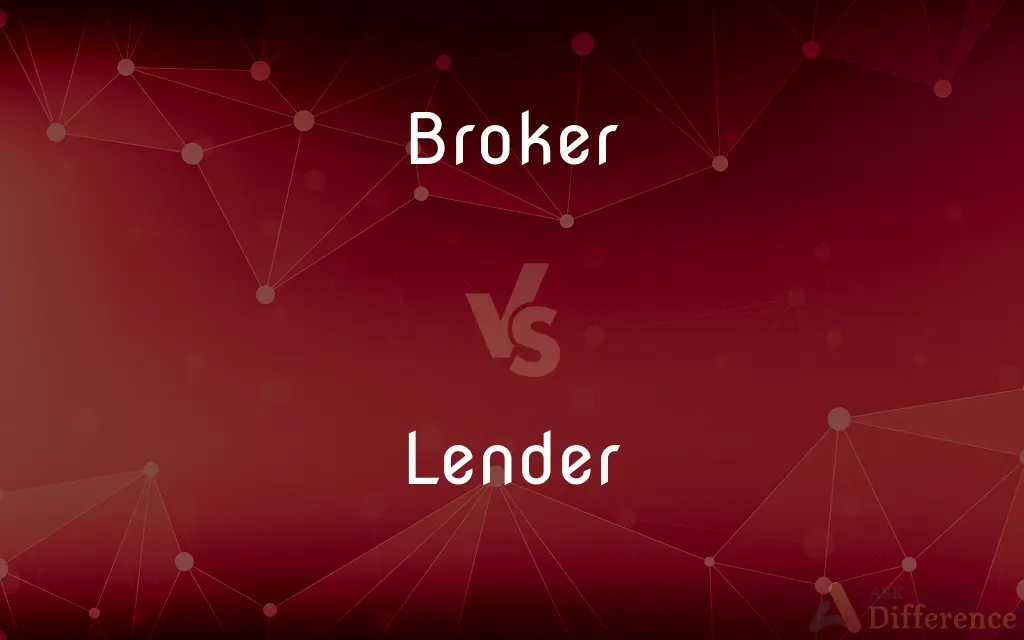Broker vs. Lender — What's the Difference?
By Fiza Rafique & Maham Liaqat — Published on September 28, 2024
A broker connects borrowers with potential lenders for loans, focusing on finding the best match, while a lender directly provides the funds for the loan.

Difference Between Broker and Lender
Table of Contents
ADVERTISEMENT
Key Differences
A broker acts as an intermediary between borrowers and lenders, offering advice and access to a variety of loan options and terms to suit the borrower's needs. They do not lend money themselves but facilitate the borrowing process by sourcing loans from multiple lenders. On the other hand, a lender is an entity (like a bank, credit union, or private company) that directly provides the funds to the borrower under agreed terms and conditions, including interest rates and repayment schedules.
Brokers often charge a fee or commission for their services, which may be paid by the borrower or the lender, depending on the agreement. This fee is for their role in finding the right loan and assisting with the application process. Lenders, however, make their money primarily through the interest charged on the loan, as well as any associated fees directly related to the loan origination and servicing.
The advantage of using a broker lies in their ability to shop around on behalf of the borrower, potentially securing more favorable loan terms than the borrower might find on their own. Lenders, while limited to their own loan products, may offer benefits like reduced fees or faster processing to borrowers who deal directly with them.
For borrowers with unique needs or circumstances, such as a less-than-perfect credit history, brokers can be particularly valuable in identifying lenders willing to accommodate these situations. Conversely, borrowers with straightforward needs and strong financial profiles might find it more advantageous to work directly with a lender to expedite the loan process.
While brokers provide a broader view of the lending market and personalized service, they may not have access to all available loans or special deals offered by lenders to direct customers. Lenders have complete control over the approval process and the terms of the loan, providing a direct line of communication for borrowers.
ADVERTISEMENT
Comparison Chart
Role
Intermediary between borrower and lenders
Direct provider of loan funds
Primary Function
To match borrowers with suitable loans
To fund loans under specific terms
Fees
Earns commission or fees for services
Profits from interest and loan fees
Advantage for Borrower
Access to multiple loan options; personalized advice
Potential direct-deal benefits; streamlined process
Suitability
Beneficial for borrowers with unique needs or those seeking best terms
Ideal for straightforward loan needs or borrowers with strong financials
Compare with Definitions
Broker
An individual or firm that acts as an intermediary, facilitating transactions between parties.
The mortgage broker helped us compare various home loan options.
Lender
An entity that provides funds to borrowers under agreed terms.
The bank acted as the lender for our home mortgage.
Broker
Charges a fee or commission for their services.
We paid a broker's fee at closing for our loan arrangement.
Lender
Charges interest on the loans provided.
Our lender set a fixed interest rate for the duration of our loan.
Broker
Provides access to a wide range of products from different lenders.
Our broker presented us with loan offers from five different banks.
Lender
May offer various loan products directly to consumers.
Our lender offered us a choice between a fixed-rate and an adjustable-rate mortgage.
Broker
Offers personalized advice based on the borrower's financial situation.
The broker advised us on the best loan type for our unique financial circumstances.
Lender
Might provide incentives for direct dealing.
The lender offered a discount on closing costs for direct applicants.
Broker
Can expedite the loan application process by pre-screening options.
The broker streamlined our application, making it easier to secure the loan.
Lender
Controls the loan approval process and terms.
The lender required a detailed financial background check before approving our loan.
Broker
One that acts as an agent for others, as in negotiating contracts, purchases, or sales in return for a fee or commission.
Lender
To give or allow the use of temporarily on the condition that the same or its equivalent will be returned.
Broker
A stockbroker.
Lender
To provide (money) temporarily on condition that the amount borrowed be returned, usually with an interest fee.
Broker
A power broker.
Lender
To make available for another's use
The neighbors lent us help after the storm.
Broker
To arrange or manage as a broker
Broker an agreement among opposing factions.
Lender
To contribute or impart
Books and a fireplace lent a feeling of warmth to the room.
Broker
A mediator between a buyer and seller.
Lender
To make a loan. See Usage Note at loan.
Broker
A stockbroker.
Lender
One who lends, especially money; specifically, a bank or other entity that specializes in granting loans.
Broker
A mediator in general, one who liaises between two or more parties to attempt to achieve an outcome of some kind.
Lender
One who lends.
The borrower is servant to the lender.
Broker
(computing) An agent involved in the exchange of messages or transactions.
Lender
Someone who lends money or gives credit in business matters
Broker
(intransitive) To act as a broker; to mediate in a sale or transaction.
Broker
(transitive) To act as a broker in; to arrange or negotiate.
Broker
One who transacts business for another; an agent.
Broker
An agent employed to effect bargains and contracts, as a middleman or negotiator, between other persons, for a compensation commonly called brokerage. He takes no possession, as broker, of the subject matter of the negotiation. He generally contracts in the names of those who employ him, and not in his own.
Broker
A dealer in money, notes, bills of exchange, etc.
Broker
A dealer in secondhand goods.
Broker
A pimp or procurer.
Broker
A businessman who buys or sells for another in exchange for a commission
Broker
Act as a broker
Common Curiosities
Do I need a broker to get a loan?
No, you can apply for a loan directly with a lender, but a broker can help you find the best terms and rates across multiple lenders.
How do brokers get paid?
Brokers are typically compensated through fees paid by either the borrower or the lender, often as a percentage of the loan amount.
Is it faster to get a loan through a broker or a lender?
This can vary; brokers might expedite the process by helping you find the best-fit lender quickly, but direct applications with lenders can be streamlined for straightforward cases.
Can lenders offer better rates than brokers?
Sometimes, as lenders may offer exclusive rates or terms to direct customers that are not available through brokers.
What is the main difference between a broker and a lender?
A broker serves as an intermediary between borrowers and multiple lenders, while a lender directly provides funds to borrowers.
What should I consider when choosing between a broker and a lender?
Consider your financial situation, the complexity of your needs, and whether you prefer personalized guidance (broker) or a direct relationship with the lender.
Should I use a broker if I have bad credit?
Yes, a broker can be particularly helpful in finding lenders willing to accommodate borrowers with less-than-ideal credit histories.
Do all brokers have access to the same lenders?
No, brokers may work with different sets of lenders, so it's beneficial to inquire about their lender network.
Can I negotiate loan terms with a lender?
Yes, borrowers can negotiate terms directly with lenders, especially if they have strong financial credentials.
Are there loans only available through brokers?
Some loan products may be exclusively available through brokers, depending on their agreements with lenders.
How do I know if a broker is reputable?
Research their credentials, read reviews, and check for any regulatory actions or complaints.
Can I switch from a broker to a lender during the loan process?
Yes, but this might require a new application and could delay the process.
Can brokers offer lower rates than lenders?
Brokers might access promotional rates from lenders due to the volume of business they generate, potentially offering lower rates.
Is it possible to work with multiple brokers?
While possible, working with multiple brokers can complicate the process; it's usually best to work with one trusted broker.
Do lenders prefer working with brokers?
Some lenders value brokers as they bring in business, while others prefer direct interaction with borrowers.
Share Your Discovery

Previous Comparison
Bullmastiff vs. English Mastiff
Next Comparison
Body Lift vs. Suspension LiftAuthor Spotlight
Written by
Fiza RafiqueFiza Rafique is a skilled content writer at AskDifference.com, where she meticulously refines and enhances written pieces. Drawing from her vast editorial expertise, Fiza ensures clarity, accuracy, and precision in every article. Passionate about language, she continually seeks to elevate the quality of content for readers worldwide.
Co-written by
Maham Liaqat












































